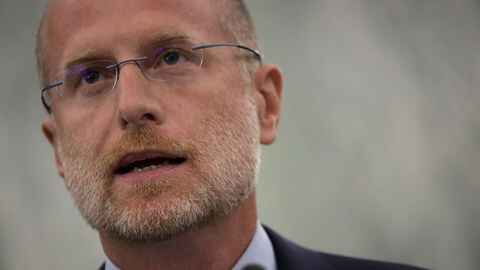Carr was previously the senior Republican on the Federal Communications Commission (FCC), an independent agency that oversees the pricing of home internet, television and radio licenses, and other communications matters in the United States.
In a statement released on Sunday, US President-elect Donald Trump referred to Republican Brendan Carr, a huge tech critic favored by Elon Musk, as a “warrior for Free Speech” and appointed him to head the Federal Communications Commission (FCC).
Carr had “fought against the regulatory Lawfare that has stifled Americans’ Freedoms” and is going to “end the regulatory onslaught that has been crippling America’s Job Creators and Innovators, and ensure that the FCC delivers for rural America,” Trump stated in his statement.
Carr stated that he was “humbled and honored” to assume the position of FCC chairman on Musk’s social media site, X.
In another article, he stated, “We must dismantle the censorship cartel and restore free speech rights for everyday Americans.”
He has formed a partnership with billionaire Musk, Trump’s biggest supporter, whose Starlink satellite internet business may gain access to federal funding, and has long been speculated as a candidate for FCC chair.
According to the New York Times, the FCC awarded Starlink a $885 million grant in late 2020, but the Democrat-led panel later withdrew it because the service was unable to demonstrate that it will reach enough rural houses without internet access.
Carr “vociferously” disagreed with the ruling, according to the newspaper.
In an editorial piece published in the Wall Street Journal last month, he stated, “In my opinion, it amounted to nothing more than regulatory lawfare against one of the left’s top targets: Mr. Musk.”
Carr has also openly supported the Trump administration’s pledges to reduce regulations and penalize TV networks for alleged political bias.
Trump has frequently demanded that licenses for big broadcasters like ABC, NBC, and CBS be revoked.
He specifically targeted CBS during the 2024 campaign, claiming that the network’s license ought to be canceled because its premier news show “60 Minutes” featured an interview with Kamala Harris, his Democratic opponent. Trump had refused to participate in a comparable interview.
In the contentious Project 2025 memo, which allegedly outlined a plan for a second Trump administration, Carr also wrote a chapter on the FCC and advocated for the regulation of the biggest tech firms, including Apple, Google, and Meta.
In the report published by the conservative Heritage Foundation, he stated that the FCC must give new immediacy to four primary objectives: guaranteeing FCC accountability, boosting national security, “unleashing” economic growth, and regulating big tech.






